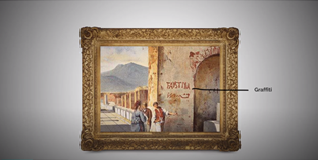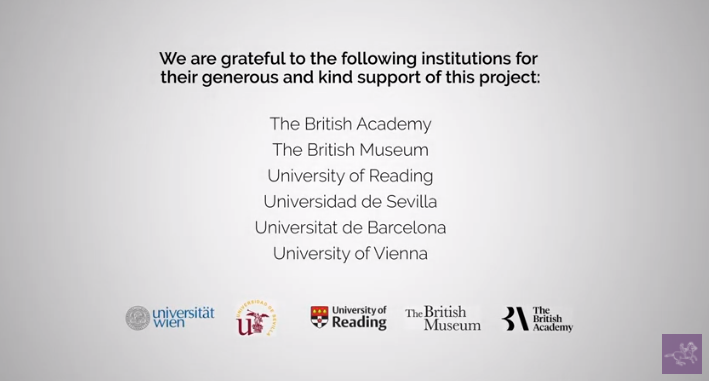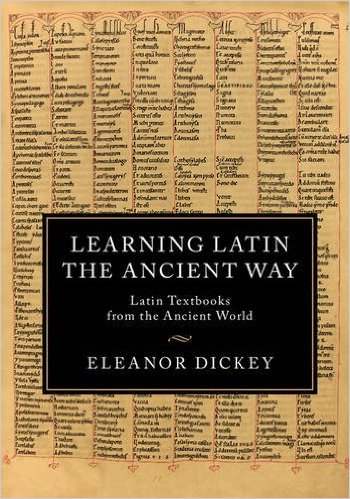Date: 12th March 2021.
To register for the conference, please fill in our online form here.
PROGRAMME
Tuesday 6 April
11am – 12.30pm: Inclusive Classics and pedagogy: teachers, academics and students in conversation A follow up to the Towards a More Inclusive Classics Workshop held 25-26 June 2020.
Panel co-chairs: Professor Barbara Goff, University of Reading and Dr Alexia Petsalis-Diomidis, University of St Andrews
OUTLINE
Spotlight 3-minute talks: ‘visions of inclusive classics’
· Lauren Canham, Trainee Teacher at Jane Austen College, Norwich: ‘Ancient Paradigms of Disability on the Curriculum’
· Hardeep Dhindsa, PhD candidate, Department of Classics, King’s College London: ‘Chromophobia: Recolouring the Classics’
· Dr Victoria Leonard, Research Fellow at the Centre for Arts, Memory and Communities, Coventry University: ‘Caring in Classics Network’
· Joe Watson, PhD candidate, Department of Classics and Ancient History, University of Durham: ‘Queer Classics and Classics for Queers; or, Beyond Gay Men Reading Plato’
· Dr Bobby Xinyue, British Academy Early Career Fellow, Department of Classics and Ancient History & Centre for the Study of the Renaissance, University of Warwick: ‘Race, Inclusivity, and the Future of Classics’
Opening remarks:
· Dr Alexia Petsalis-Diomidis, University of St Andrews
· Professor Barbara Goff, University of Reading
Panel discussion on inclusive classics in teaching and learning
· Tristan Craig, Undergraduate Representative for History, Classics and Archaeology, University of Edinburgh
· Florence, a Classical Civilisation student, Runshaw College, Lancashire
· Dr Justine McConnell, Senior Lecturer in Comparative Literature, King’s College London
· Claude McNaughton, Teacher, Pimlico Academy, London
· Rosie Tootell, Teacher, Runshaw College, Lancashire
· Aaron, a Latin student, Pimlico Academy, London
Break out rooms: ‘turn to your neighbour’, 10-minute exchange of responses to the panel
Closing remarks:
· Dr Amy Coker, Cheltenham Ladies’ College and University of Bristol
· Professor Katherine Harloe, University of Reading
· Dr Arlene Holmes-Henderson, University of Oxford
· Professor Neville Morley, University of Bristol
· Professor Isabel Ruffell, University of Glasgow
· Professor Tim Whitmarsh, University of Cambridge
2.00pm – 3.30pm: Accessing Classical Civilisation and Ancient History in Britain, past and present perspectives (under the auspices of ACE)
Professor Edith Hall, Dr Henry Stead, Dr Arlene Holmes-Henderson and Peter Wright
Wednesday 7 April
2:00pm – 2.45pm: Presidential Address by Mari Williams, winner of the Daniel Owen Memorial Prize at the National Eisteddfod of Wales in 2018, for her novel Ysbryd yr Oes (‘Spirit of the Age’)
2.45pm – 3.30pm: Presentation of the CA Prize for 2021 and the inaugural CA Teaching Awards by Natalie Haynes
7.00pm – 8.30pm: Greek theatre online: An evening of classics-inspired theatre, featuring new material from three UK-based groups, Out of Chaos and By Jove theatre companies, and film company Barefaced Greek, followed by a Q&A chaired by Professor James Robson
Thursday 8 April
11am – 12 noon: Developing Classics in the local community: CA Branches in 2021
Katrina Kelly (CA Branches Officer and Chair of Lytham St Annes CA) and colleagues from around the regions
2.00pm – 3.30pm: Classics in the marketplace: being a Classicist in public
Dr Liz Gloyn, Dr Jane Draycott, Dr Mai Musié and Professor Neville Morley
FAQs
When is the Conference taking place?
6-8 April 2021
Will there be any face-to-face events? –
No, everything will take place online.
Is there a fee? – No, all events are free. You can attend as many or as few as you wish.
Do I need to be a member of the Classical Association to attend? – No, you may attend regardless of your membership status.
Can I submit a paper/panel to be presented? – Unfortunately not, this year’s conference focuses on key issues facing classicists, including inclusivity, employability and the performance of classical texts in the online world, and we will have a limited number of invited speakers/panels.
How do I attend? – All delegates will be contacted closer to the event via email with links and instructions about how to join the sessions.
How do I get in touch with you for more information? – Please email CA2021@classicalassociation.org
You can view full details of the provisional programme here.
Abstracts are available here.




 Thank you so much for this – it’s great for us to be back for a little while, albeit virtually. All three of us share the same passion: our enthusiasm for Roman inscriptions, especially inscriptions composed in verse. To us, those inscriptions are not just stones or pieces of metal that happen to have some poetry inscribed on them. They are carriers of art. They are visible, tangible manifestations of a universal artistic practice of Roman times, spanning the empire across time and space, with thousands of examples surviving to the present day.
Thank you so much for this – it’s great for us to be back for a little while, albeit virtually. All three of us share the same passion: our enthusiasm for Roman inscriptions, especially inscriptions composed in verse. To us, those inscriptions are not just stones or pieces of metal that happen to have some poetry inscribed on them. They are carriers of art. They are visible, tangible manifestations of a universal artistic practice of Roman times, spanning the empire across time and space, with thousands of examples surviving to the present day.

 We wanted to make a number of strong, important points. About the way in which we perceive, in which we encounter the Roman world. About the way the ancient world is presented to us in museums, archives, exhibitions, and books. And we want to do so while racing a wide audience because what we have to say and offer is relevant to so many different audiences.
We wanted to make a number of strong, important points. About the way in which we perceive, in which we encounter the Roman world. About the way the ancient world is presented to us in museums, archives, exhibitions, and books. And we want to do so while racing a wide audience because what we have to say and offer is relevant to so many different audiences. We want to enthuse new generations with our passion for Roman history, for poetry, for epigraphy. We want to give teachers the opportunity to expand the canon of teaching through the inclusion of poetry that students can easily relate to. We want to invite museums, collections, and policymakers to rethink their approach to the way in which these incredibly exciting, talking objects from the ancient world are displayed. What better way to achieve this than to choose a text that expresses, in such beautiful words, the grief of pet owners – whose faithful companion had died. We feel we all can relate to that, and we feel that this text alone opens up so many new ways of thinking about the Roman world and the people who “were” the Romans, than the ever-same repertoire of classical authors.
We want to enthuse new generations with our passion for Roman history, for poetry, for epigraphy. We want to give teachers the opportunity to expand the canon of teaching through the inclusion of poetry that students can easily relate to. We want to invite museums, collections, and policymakers to rethink their approach to the way in which these incredibly exciting, talking objects from the ancient world are displayed. What better way to achieve this than to choose a text that expresses, in such beautiful words, the grief of pet owners – whose faithful companion had died. We feel we all can relate to that, and we feel that this text alone opens up so many new ways of thinking about the Roman world and the people who “were” the Romans, than the ever-same repertoire of classical authors.
 Haha, oh dear! Well… none of us are natural-born entertainers. We all were terrified and at first, we hated to see our faces and hear our recorded voices. But
Haha, oh dear! Well… none of us are natural-born entertainers. We all were terrified and at first, we hated to see our faces and hear our recorded voices. But  We hope that putting this video out there will make it available for generations to come – for pupils, teachers, academics, cultural managers, policy makers: it should entertain and be useful at the same time! It’s genuinely a piece of art.
We hope that putting this video out there will make it available for generations to come – for pupils, teachers, academics, cultural managers, policy makers: it should entertain and be useful at the same time! It’s genuinely a piece of art.


 Mairs, Rachel (Ed.) 2021. The Graeco-Bactrian and Indo-Greek World. Routledge.
Mairs, Rachel (Ed.) 2021. The Graeco-Bactrian and Indo-Greek World. Routledge.
 Marzano, Annalisa. 2021. Caesar’s triumphal banquet of 46 BC: A Hypothesis on its Political Significance on the Basis of a Recent Epigraphic Discovery from Pompeii in: politica antica 10: 99-107.
Marzano, Annalisa. 2021. Caesar’s triumphal banquet of 46 BC: A Hypothesis on its Political Significance on the Basis of a Recent Epigraphic Discovery from Pompeii in: politica antica 10: 99-107. Finglass, P.J., Kelly, A. (Eds.) 2021. The Cambridge Companion to Sappho. Cambridge University Press. With chapters by Harloe, K, Goff, B.
Finglass, P.J., Kelly, A. (Eds.) 2021. The Cambridge Companion to Sappho. Cambridge University Press. With chapters by Harloe, K, Goff, B.



 [Dr Mayorga and Assistant Curator of the Ure Museum Jayne Holly on a research trip. Mayorga.]
[Dr Mayorga and Assistant Curator of the Ure Museum Jayne Holly on a research trip. Mayorga.]



 Fear is a driving force behind human action, capable of pushing people to either exceed their own expectations or to prevent them from acting at all. As a powerful motivator, the emotion of fear had a pervasive presence in ancient life and thought. This is reflected in multiple ways throughout literature, juxtaposed with motivation, social interaction and power dynamics. Furthermore, as early as Aristotle’s Poetics, fear had already been understood as a ruling force and powerful notion for the construction of literary genres, especially tragedy. While evaluating the ancient literature as an integral part of understanding such a concept, the diverse influences of different fields of study, such as literary criticism, political theory, psychoanalysis, and philosophy, can add valuable insights.
Fear is a driving force behind human action, capable of pushing people to either exceed their own expectations or to prevent them from acting at all. As a powerful motivator, the emotion of fear had a pervasive presence in ancient life and thought. This is reflected in multiple ways throughout literature, juxtaposed with motivation, social interaction and power dynamics. Furthermore, as early as Aristotle’s Poetics, fear had already been understood as a ruling force and powerful notion for the construction of literary genres, especially tragedy. While evaluating the ancient literature as an integral part of understanding such a concept, the diverse influences of different fields of study, such as literary criticism, political theory, psychoanalysis, and philosophy, can add valuable insights.


